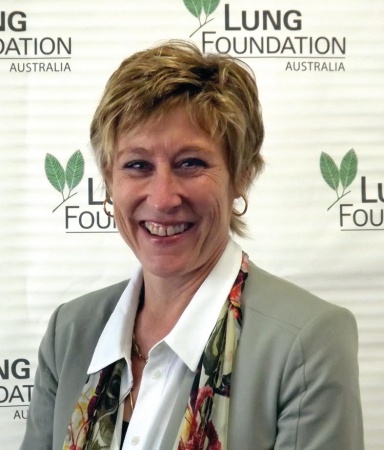
Heather Allan, Lung Foundation Australia CEO
From the Lung Foundation Australia website
Lung Foundation Australia has welcomed the recent call from a cross-party Senate Committee to make more research a priority for low survival cancers, saying it will provide much needed hope for the lung cancer community.
Lung Foundation Australia CEO, Ms Heather Allan, stressed the importance of this milestone and its potential impact.
“Lung cancer is a devastating diagnosis; it has the second lowest survival rate of all cancers, with only 15% surviving five years past their diagnosis. It is also Australia’s biggest cancer killer, killing one Australian every hour, which is more Australians than Breast, Prostate and Ovarian cancers combined. Despite this, less than five cents of every research dollaris currently invested in potentially life-saving research, “Ms Allan said.
“This level of funding for lung cancer research is woeful. We know that research improves outcomes. We have seen survival rates for other cancers such as breast improve dramatically in the past 25 years through sustained investment in focused research.
“Research offers hope and undisputed benefits for people with cancer – This Senate Committee finding is a positive statement for all low survival cancers and a testament to the stories of the families and people involved in the Enquiry.
“It is our hope that the Federal Government is able to move forward with this recommendation as soon as possible – there are 34 people being diagnosed with lung cancer every day,” she said.
Alexandra Golledge, a 36 year-old never-smoker who was diagnosed with lung cancer in 2012, is a living, breathing example of research and its benefits.
“I am one of a small percentage of lung cancer patients whose cancer has a rare mutation known as ALK+ (anaplastic lymphoma kinase-positive),” Ms Golledge said.
“This means that I have available to me a targeted therapy in the form of a tablet that attacks only the cancer cells; unlike chemotherapy that destroys both healthy and cancerous cells alike. While not providing a cure, targeted therapies offer both time and quality of life, two commodities that are indescribably precious.
“I live with hope that more research will be undertaken into new treatments that will extend my life longer than expected, and bring hope to many more lung cancer patients who currently don’t have a lot of treatment options available to them,” she said.
You can view the Senate Enquiry report here.
Lung Foundation Australia offers a range of resource and support services to people living with lung cancer. For more information, please contact 1800 654 301 or visit lungfoundation.com.au
Lung cancer facts
- Lung cancer is Australia’s biggest cancer killer yet it receives less research and clinical trial funding than other cancers.
- During 2009-2011, lung cancer was responsible for three times as many deaths as breast cancer and received one-fifth the amount of research funding.
- While the biggest risk factor for lung cancer is exposure to tobacco smoke, one in three women and one in ten men diagnosed with lung cancer will have never smoked and this proportion has increased over time. Occupational exposure is estimated to contribute to 29% of lung cancer in men and 5.3% in women.
- The link between lung cancer and tobacco smoking, including public health campaigns to discourage smoking, has led to negative associations and attitudes about lung cancer and towards people with the disease.
- In a global survey conducted in 15 countries, Australians had the least sympathy for someone diagnosed with lung cancer, compared with other cancers, based on its association with tobacco smoking.
- Patients with lung cancer report feelings of guilt and shame, contributing to a sense that they are somehow less worthy.
- Discrimination or the fear of discrimination leads to feeling alienated, fearful or undeserving and the fear that symptoms might not be taken seriously leads to delays in seeking diagnosis and treatment.
Reference: Lung Foundation Australia, Improving outcomes for Australians with lung cancer: A Call to Action (2016) https://lungfoundation.com.au/wp-content/uploads/2016/08/LFA-improving-outcomes-report-0816-proof10.pdf


